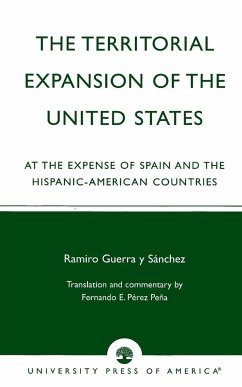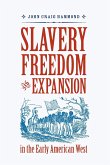Ramiro Guerra Y Sánchez
The Territorial Expansion of the United States
At the Expense of Spain and the Hispanic-American Countries
Ramiro Guerra Y Sánchez
The Territorial Expansion of the United States
At the Expense of Spain and the Hispanic-American Countries
- Broschiertes Buch
- Merkliste
- Auf die Merkliste
- Bewerten Bewerten
- Teilen
- Produkt teilen
- Produkterinnerung
- Produkterinnerung
Originally published in Cuba in 1934, Territorial Expansion of the United States is the first and only English translation of Ramiro Guerra y Sánchez's work. "Yankee imperialism" has generally been identified as the period in American history after the war with Spain and the seizure of the Panama canal zone until the advent of the "good neighbor" policy, as declared by President Franklin D. Roosevelt in the 1930's.
Andere Kunden interessierten sich auch für
![The United States In Our Own Time V1 The United States In Our Own Time V1]() E. Benjamin AndrewsThe United States In Our Own Time V143,99 €
E. Benjamin AndrewsThe United States In Our Own Time V143,99 €![Register of the Department of State; containing a list of persons employed in the department and in the diplomatic, consular and territorial service of the United States, with maps showing where the ministers and consuls are resident abroad Register of the Department of State; containing a list of persons employed in the department and in the diplomatic, consular and territorial service of the United States, with maps showing where the ministers and consuls are resident abroad]() UnknownRegister of the Department of State; containing a list of persons employed in the department and in the diplomatic, consular and territorial service of the United States, with maps showing where the ministers and consuls are resident abroad20,99 €
UnknownRegister of the Department of State; containing a list of persons employed in the department and in the diplomatic, consular and territorial service of the United States, with maps showing where the ministers and consuls are resident abroad20,99 €![Slavery, Freedom, and Expansion in the Early American West Slavery, Freedom, and Expansion in the Early American West]() John Craig HammondSlavery, Freedom, and Expansion in the Early American West45,99 €
John Craig HammondSlavery, Freedom, and Expansion in the Early American West45,99 €![The United States Army, A Historical Dictionary The United States Army, A Historical Dictionary]() Clayton R. NewellThe United States Army, A Historical Dictionary186,99 €
Clayton R. NewellThe United States Army, A Historical Dictionary186,99 €![Women Music Educators in the United States Women Music Educators in the United States]() Sondra Wieland HoweWomen Music Educators in the United States144,99 €
Sondra Wieland HoweWomen Music Educators in the United States144,99 €![The Territorial Enterprise Building In Virginia City, Nevada The Territorial Enterprise Building In Virginia City, Nevada]() Sandie La NaeThe Territorial Enterprise Building In Virginia City, Nevada23,99 €
Sandie La NaeThe Territorial Enterprise Building In Virginia City, Nevada23,99 €![Expansion and Conflict Expansion and Conflict]() William Edward DoddExpansion and Conflict21,99 €
William Edward DoddExpansion and Conflict21,99 €-
-
-
Originally published in Cuba in 1934, Territorial Expansion of the United States is the first and only English translation of Ramiro Guerra y Sánchez's work. "Yankee imperialism" has generally been identified as the period in American history after the war with Spain and the seizure of the Panama canal zone until the advent of the "good neighbor" policy, as declared by President Franklin D. Roosevelt in the 1930's.
Hinweis: Dieser Artikel kann nur an eine deutsche Lieferadresse ausgeliefert werden.
Hinweis: Dieser Artikel kann nur an eine deutsche Lieferadresse ausgeliefert werden.
Produktdetails
- Produktdetails
- Verlag: Globe Pequot Publishing Group Inc/Bloomsbury
- Seitenzahl: 424
- Erscheinungstermin: 17. Juli 2003
- Englisch
- Abmessung: 203mm x 127mm x 23mm
- Gewicht: 453g
- ISBN-13: 9780761825685
- ISBN-10: 0761825681
- Artikelnr.: 55311489
- Herstellerkennzeichnung
- Libri GmbH
- Europaallee 1
- 36244 Bad Hersfeld
- gpsr@libri.de
- Verlag: Globe Pequot Publishing Group Inc/Bloomsbury
- Seitenzahl: 424
- Erscheinungstermin: 17. Juli 2003
- Englisch
- Abmessung: 203mm x 127mm x 23mm
- Gewicht: 453g
- ISBN-13: 9780761825685
- ISBN-10: 0761825681
- Artikelnr.: 55311489
- Herstellerkennzeichnung
- Libri GmbH
- Europaallee 1
- 36244 Bad Hersfeld
- gpsr@libri.de
By Ramiro Guerra y Sánchez - Translated by Fernando E. Pérez Peña
Chapter 1 Introduction: Tragic Contradictions in the History of Cuba
The Cuban War of Independence Opens the Way South for the United States
Jose Marti's Ideals and the Realities of History
United States Expansionist Movement, a Constant in Origin and Deve Chapter 2 Chapter I: Theodore Roosevelt's Forefathers and Precursors
Primitive Anglo-Saxons
Similarities Between the Conquest of England and North America
From the North Sea Coastal Swamps to the Western Woods
Racial and Psychological Unity of Europeans a Chapter 3 Chapter II First Contacts in the West Between Spain and the United States
Conflict of Interests Between the Two Countries
Hatred and Scorn of the Norteamericanos for the Spaniards
Increase in Land Speculation in the West
Danger of War and Diplom Chapter 4 Chapter III: The First Great Spanish Recoil in America
Return of Louisiana to France
The Immediate Sale of the Province to the United States
Frontiersmen's Role According to Theodore Roosevelt
Toussaint L'Ouverture's Resistance to Napoleon Bonap Chapter 5 Chapter IV: The United States Purchase West Florida, Without Knowing It or Paying for It
Jefferson Completes His Method for Expansion: an Assault at the "Difficult Moment"
Diplomatic Struggles in Washington and Madrid
Florida's Destiny in B Chapter 6 Chapter V: President Madison's First Steps in taking East Florida
Baton Rouge Revolutionary Methods Applied in Fernandina
Tortuous Diplomacy of Intrigue and Conquest
Canada and Florida in the Balance
Russia Saves Spain at the Difficult Moment
J Chapter 7 Chapter VI: Jefferson's Interest in Acquiring Cuba
Wilkinson's Early Moves in Havana
Canning's Opposition to United States Acquiring Cuba
A Cuban Proposal for Annexation in 1822
Fear of England Contains the United States
Adams' Cuban Policy
It Chapter 8 Chapter VII: The Monroe Doctrine and Expansionism
The Doctrine's Function in Conjunction with the Principles of "Waiting Patiently" and "Keeping the Prize in the Weakest Hands"
Respective Position s of England and the United States in 1823
Cannin Chapter 9 Chapter VIII: Early Western Ambitions over Texas
First Attempts on the Province
Texas, Part of the Republic of Mexico
Mexican Concessions to the Frontier People
United States' Purchase Plans
Mexican Defensive Reaction
One Method of Conquest De Chapter 10 Chapter IX: President Polk and "Manifest Destiny"
New Aspects of the Expansionist Movement
Polk's Plans
Unto Mexico as Unto Spain
How the Frontier War Was Provoked
The Desire for "All of Mexico"
Reasons Deterring Polk
The First Step Towards t Chapter 11 Chapter X: The Taking of California Extends "Manifest Destiny" to Central America and Panama
Initial United States Attitude Towards a Canal on the Isthmus
Radical Change of Policy After the War Against Mexico
English Opposition to United States P Chapter 12 Chapter XI: New Attempts at Annexation in Cuba, in Agreement With the Slave-Owners in the South
Taylor and Fillmore's Circumstantial Opposition
The United States Firm in Their Desire to Acquire Cuba
Everett's Response to the Proposal for a Guaran Chapter 13 Chapter XII: Signs of British Withdrawl from Central America and the Caribbean
Seward's Expansionism
His Sights on the Caribbean and the Isthmus
Congressional Opposition to Johnson
Expansionist Tendencies During Grand's Presidency
Canada, Cuba Chapter 14 Chapter XIII: New United States Interest in the Isthmus
The Policy of "A United States Canal"
The New Spirit of Expansionism and Factors in Its Favor in the 1890's
Brusque Surge of Monroe-ism in 1895
The United States, Sovereign of America
The Chapter 15 Chapter XIV: A Time of Plenty in the United States at the Beginning of 1898
Captain Mahan's Imperialist Philosophy
A New Program of Annexations
"Manifest Destiny" in 1898
Policy of the Cuban Revolutionary Governing Council
McKinley's Desi Chapter 16 Chapter XVI: Derogation of the Clayton-Bulwer Treaty
The New Panama Canal Company, Its Moves in the United States
United States Negotiations with Colombia
The Hay-Herran Treaty
The New Company Cheats Colombia
Colombia Resistance to Ratifying th Chapter 17 Chapter XVII: United States Danger Zone at the Beginning of the 20th Century
Plattism and Interventionism: Their Aims
The Nicaraguan Case, Root's Policy, Knox, Their Antecedents, the End of Dollar Diplomacy
Knox and Zelaya
The Nicara Chapter 18 Chapter XVIII: Tendencies to Historic Prediction and the Uncertainty Thereof
Statements Useless to Judge Future
Constant Contradiction Between Theoretical Statements and Reality
Facts, Not Words, the Basis of Judgment
Current United States Posit Chapter 19 Bibliography Chapter 20 Epilogue
The Cuban War of Independence Opens the Way South for the United States
Jose Marti's Ideals and the Realities of History
United States Expansionist Movement, a Constant in Origin and Deve Chapter 2 Chapter I: Theodore Roosevelt's Forefathers and Precursors
Primitive Anglo-Saxons
Similarities Between the Conquest of England and North America
From the North Sea Coastal Swamps to the Western Woods
Racial and Psychological Unity of Europeans a Chapter 3 Chapter II First Contacts in the West Between Spain and the United States
Conflict of Interests Between the Two Countries
Hatred and Scorn of the Norteamericanos for the Spaniards
Increase in Land Speculation in the West
Danger of War and Diplom Chapter 4 Chapter III: The First Great Spanish Recoil in America
Return of Louisiana to France
The Immediate Sale of the Province to the United States
Frontiersmen's Role According to Theodore Roosevelt
Toussaint L'Ouverture's Resistance to Napoleon Bonap Chapter 5 Chapter IV: The United States Purchase West Florida, Without Knowing It or Paying for It
Jefferson Completes His Method for Expansion: an Assault at the "Difficult Moment"
Diplomatic Struggles in Washington and Madrid
Florida's Destiny in B Chapter 6 Chapter V: President Madison's First Steps in taking East Florida
Baton Rouge Revolutionary Methods Applied in Fernandina
Tortuous Diplomacy of Intrigue and Conquest
Canada and Florida in the Balance
Russia Saves Spain at the Difficult Moment
J Chapter 7 Chapter VI: Jefferson's Interest in Acquiring Cuba
Wilkinson's Early Moves in Havana
Canning's Opposition to United States Acquiring Cuba
A Cuban Proposal for Annexation in 1822
Fear of England Contains the United States
Adams' Cuban Policy
It Chapter 8 Chapter VII: The Monroe Doctrine and Expansionism
The Doctrine's Function in Conjunction with the Principles of "Waiting Patiently" and "Keeping the Prize in the Weakest Hands"
Respective Position s of England and the United States in 1823
Cannin Chapter 9 Chapter VIII: Early Western Ambitions over Texas
First Attempts on the Province
Texas, Part of the Republic of Mexico
Mexican Concessions to the Frontier People
United States' Purchase Plans
Mexican Defensive Reaction
One Method of Conquest De Chapter 10 Chapter IX: President Polk and "Manifest Destiny"
New Aspects of the Expansionist Movement
Polk's Plans
Unto Mexico as Unto Spain
How the Frontier War Was Provoked
The Desire for "All of Mexico"
Reasons Deterring Polk
The First Step Towards t Chapter 11 Chapter X: The Taking of California Extends "Manifest Destiny" to Central America and Panama
Initial United States Attitude Towards a Canal on the Isthmus
Radical Change of Policy After the War Against Mexico
English Opposition to United States P Chapter 12 Chapter XI: New Attempts at Annexation in Cuba, in Agreement With the Slave-Owners in the South
Taylor and Fillmore's Circumstantial Opposition
The United States Firm in Their Desire to Acquire Cuba
Everett's Response to the Proposal for a Guaran Chapter 13 Chapter XII: Signs of British Withdrawl from Central America and the Caribbean
Seward's Expansionism
His Sights on the Caribbean and the Isthmus
Congressional Opposition to Johnson
Expansionist Tendencies During Grand's Presidency
Canada, Cuba Chapter 14 Chapter XIII: New United States Interest in the Isthmus
The Policy of "A United States Canal"
The New Spirit of Expansionism and Factors in Its Favor in the 1890's
Brusque Surge of Monroe-ism in 1895
The United States, Sovereign of America
The Chapter 15 Chapter XIV: A Time of Plenty in the United States at the Beginning of 1898
Captain Mahan's Imperialist Philosophy
A New Program of Annexations
"Manifest Destiny" in 1898
Policy of the Cuban Revolutionary Governing Council
McKinley's Desi Chapter 16 Chapter XVI: Derogation of the Clayton-Bulwer Treaty
The New Panama Canal Company, Its Moves in the United States
United States Negotiations with Colombia
The Hay-Herran Treaty
The New Company Cheats Colombia
Colombia Resistance to Ratifying th Chapter 17 Chapter XVII: United States Danger Zone at the Beginning of the 20th Century
Plattism and Interventionism: Their Aims
The Nicaraguan Case, Root's Policy, Knox, Their Antecedents, the End of Dollar Diplomacy
Knox and Zelaya
The Nicara Chapter 18 Chapter XVIII: Tendencies to Historic Prediction and the Uncertainty Thereof
Statements Useless to Judge Future
Constant Contradiction Between Theoretical Statements and Reality
Facts, Not Words, the Basis of Judgment
Current United States Posit Chapter 19 Bibliography Chapter 20 Epilogue
Chapter 1 Introduction: Tragic Contradictions in the History of Cuba
The Cuban War of Independence Opens the Way South for the United States
Jose Marti's Ideals and the Realities of History
United States Expansionist Movement, a Constant in Origin and Deve Chapter 2 Chapter I: Theodore Roosevelt's Forefathers and Precursors
Primitive Anglo-Saxons
Similarities Between the Conquest of England and North America
From the North Sea Coastal Swamps to the Western Woods
Racial and Psychological Unity of Europeans a Chapter 3 Chapter II First Contacts in the West Between Spain and the United States
Conflict of Interests Between the Two Countries
Hatred and Scorn of the Norteamericanos for the Spaniards
Increase in Land Speculation in the West
Danger of War and Diplom Chapter 4 Chapter III: The First Great Spanish Recoil in America
Return of Louisiana to France
The Immediate Sale of the Province to the United States
Frontiersmen's Role According to Theodore Roosevelt
Toussaint L'Ouverture's Resistance to Napoleon Bonap Chapter 5 Chapter IV: The United States Purchase West Florida, Without Knowing It or Paying for It
Jefferson Completes His Method for Expansion: an Assault at the "Difficult Moment"
Diplomatic Struggles in Washington and Madrid
Florida's Destiny in B Chapter 6 Chapter V: President Madison's First Steps in taking East Florida
Baton Rouge Revolutionary Methods Applied in Fernandina
Tortuous Diplomacy of Intrigue and Conquest
Canada and Florida in the Balance
Russia Saves Spain at the Difficult Moment
J Chapter 7 Chapter VI: Jefferson's Interest in Acquiring Cuba
Wilkinson's Early Moves in Havana
Canning's Opposition to United States Acquiring Cuba
A Cuban Proposal for Annexation in 1822
Fear of England Contains the United States
Adams' Cuban Policy
It Chapter 8 Chapter VII: The Monroe Doctrine and Expansionism
The Doctrine's Function in Conjunction with the Principles of "Waiting Patiently" and "Keeping the Prize in the Weakest Hands"
Respective Position s of England and the United States in 1823
Cannin Chapter 9 Chapter VIII: Early Western Ambitions over Texas
First Attempts on the Province
Texas, Part of the Republic of Mexico
Mexican Concessions to the Frontier People
United States' Purchase Plans
Mexican Defensive Reaction
One Method of Conquest De Chapter 10 Chapter IX: President Polk and "Manifest Destiny"
New Aspects of the Expansionist Movement
Polk's Plans
Unto Mexico as Unto Spain
How the Frontier War Was Provoked
The Desire for "All of Mexico"
Reasons Deterring Polk
The First Step Towards t Chapter 11 Chapter X: The Taking of California Extends "Manifest Destiny" to Central America and Panama
Initial United States Attitude Towards a Canal on the Isthmus
Radical Change of Policy After the War Against Mexico
English Opposition to United States P Chapter 12 Chapter XI: New Attempts at Annexation in Cuba, in Agreement With the Slave-Owners in the South
Taylor and Fillmore's Circumstantial Opposition
The United States Firm in Their Desire to Acquire Cuba
Everett's Response to the Proposal for a Guaran Chapter 13 Chapter XII: Signs of British Withdrawl from Central America and the Caribbean
Seward's Expansionism
His Sights on the Caribbean and the Isthmus
Congressional Opposition to Johnson
Expansionist Tendencies During Grand's Presidency
Canada, Cuba Chapter 14 Chapter XIII: New United States Interest in the Isthmus
The Policy of "A United States Canal"
The New Spirit of Expansionism and Factors in Its Favor in the 1890's
Brusque Surge of Monroe-ism in 1895
The United States, Sovereign of America
The Chapter 15 Chapter XIV: A Time of Plenty in the United States at the Beginning of 1898
Captain Mahan's Imperialist Philosophy
A New Program of Annexations
"Manifest Destiny" in 1898
Policy of the Cuban Revolutionary Governing Council
McKinley's Desi Chapter 16 Chapter XVI: Derogation of the Clayton-Bulwer Treaty
The New Panama Canal Company, Its Moves in the United States
United States Negotiations with Colombia
The Hay-Herran Treaty
The New Company Cheats Colombia
Colombia Resistance to Ratifying th Chapter 17 Chapter XVII: United States Danger Zone at the Beginning of the 20th Century
Plattism and Interventionism: Their Aims
The Nicaraguan Case, Root's Policy, Knox, Their Antecedents, the End of Dollar Diplomacy
Knox and Zelaya
The Nicara Chapter 18 Chapter XVIII: Tendencies to Historic Prediction and the Uncertainty Thereof
Statements Useless to Judge Future
Constant Contradiction Between Theoretical Statements and Reality
Facts, Not Words, the Basis of Judgment
Current United States Posit Chapter 19 Bibliography Chapter 20 Epilogue
The Cuban War of Independence Opens the Way South for the United States
Jose Marti's Ideals and the Realities of History
United States Expansionist Movement, a Constant in Origin and Deve Chapter 2 Chapter I: Theodore Roosevelt's Forefathers and Precursors
Primitive Anglo-Saxons
Similarities Between the Conquest of England and North America
From the North Sea Coastal Swamps to the Western Woods
Racial and Psychological Unity of Europeans a Chapter 3 Chapter II First Contacts in the West Between Spain and the United States
Conflict of Interests Between the Two Countries
Hatred and Scorn of the Norteamericanos for the Spaniards
Increase in Land Speculation in the West
Danger of War and Diplom Chapter 4 Chapter III: The First Great Spanish Recoil in America
Return of Louisiana to France
The Immediate Sale of the Province to the United States
Frontiersmen's Role According to Theodore Roosevelt
Toussaint L'Ouverture's Resistance to Napoleon Bonap Chapter 5 Chapter IV: The United States Purchase West Florida, Without Knowing It or Paying for It
Jefferson Completes His Method for Expansion: an Assault at the "Difficult Moment"
Diplomatic Struggles in Washington and Madrid
Florida's Destiny in B Chapter 6 Chapter V: President Madison's First Steps in taking East Florida
Baton Rouge Revolutionary Methods Applied in Fernandina
Tortuous Diplomacy of Intrigue and Conquest
Canada and Florida in the Balance
Russia Saves Spain at the Difficult Moment
J Chapter 7 Chapter VI: Jefferson's Interest in Acquiring Cuba
Wilkinson's Early Moves in Havana
Canning's Opposition to United States Acquiring Cuba
A Cuban Proposal for Annexation in 1822
Fear of England Contains the United States
Adams' Cuban Policy
It Chapter 8 Chapter VII: The Monroe Doctrine and Expansionism
The Doctrine's Function in Conjunction with the Principles of "Waiting Patiently" and "Keeping the Prize in the Weakest Hands"
Respective Position s of England and the United States in 1823
Cannin Chapter 9 Chapter VIII: Early Western Ambitions over Texas
First Attempts on the Province
Texas, Part of the Republic of Mexico
Mexican Concessions to the Frontier People
United States' Purchase Plans
Mexican Defensive Reaction
One Method of Conquest De Chapter 10 Chapter IX: President Polk and "Manifest Destiny"
New Aspects of the Expansionist Movement
Polk's Plans
Unto Mexico as Unto Spain
How the Frontier War Was Provoked
The Desire for "All of Mexico"
Reasons Deterring Polk
The First Step Towards t Chapter 11 Chapter X: The Taking of California Extends "Manifest Destiny" to Central America and Panama
Initial United States Attitude Towards a Canal on the Isthmus
Radical Change of Policy After the War Against Mexico
English Opposition to United States P Chapter 12 Chapter XI: New Attempts at Annexation in Cuba, in Agreement With the Slave-Owners in the South
Taylor and Fillmore's Circumstantial Opposition
The United States Firm in Their Desire to Acquire Cuba
Everett's Response to the Proposal for a Guaran Chapter 13 Chapter XII: Signs of British Withdrawl from Central America and the Caribbean
Seward's Expansionism
His Sights on the Caribbean and the Isthmus
Congressional Opposition to Johnson
Expansionist Tendencies During Grand's Presidency
Canada, Cuba Chapter 14 Chapter XIII: New United States Interest in the Isthmus
The Policy of "A United States Canal"
The New Spirit of Expansionism and Factors in Its Favor in the 1890's
Brusque Surge of Monroe-ism in 1895
The United States, Sovereign of America
The Chapter 15 Chapter XIV: A Time of Plenty in the United States at the Beginning of 1898
Captain Mahan's Imperialist Philosophy
A New Program of Annexations
"Manifest Destiny" in 1898
Policy of the Cuban Revolutionary Governing Council
McKinley's Desi Chapter 16 Chapter XVI: Derogation of the Clayton-Bulwer Treaty
The New Panama Canal Company, Its Moves in the United States
United States Negotiations with Colombia
The Hay-Herran Treaty
The New Company Cheats Colombia
Colombia Resistance to Ratifying th Chapter 17 Chapter XVII: United States Danger Zone at the Beginning of the 20th Century
Plattism and Interventionism: Their Aims
The Nicaraguan Case, Root's Policy, Knox, Their Antecedents, the End of Dollar Diplomacy
Knox and Zelaya
The Nicara Chapter 18 Chapter XVIII: Tendencies to Historic Prediction and the Uncertainty Thereof
Statements Useless to Judge Future
Constant Contradiction Between Theoretical Statements and Reality
Facts, Not Words, the Basis of Judgment
Current United States Posit Chapter 19 Bibliography Chapter 20 Epilogue








